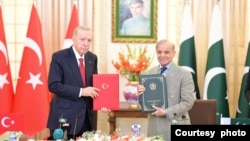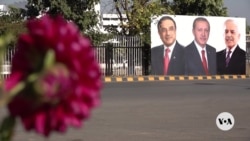Pakistan and Turkey pledged to deepen cooperation in defense, mining, energy and other sectors during the 7th round of the Pakistan-Turkey High Level Strategic Cooperation Council in Islamabad, Thursday.
Turkish President Recep Tayyip Erdogan co-chaired the highest-level bilateral discussion forum with Pakistani Prime Minister Shehbaz Sharif.
After the closed-door delegation-level talks Thursday, the two sides exchanged 24 signed documents, including a joint declaration, a few agreements, and several memoranda of understanding (MoU).
“We have agreed to further strengthen our relations,” Erdogan said in remarks broadcast live after the talks.
A brief statement from Pakistan’s Ministry of Foreign Affairs issued soon after the talks said the joint declaration “gives a roadmap for further deepening, diversifying, and institutionalizing the strategic partnership between Pakistan and Turkey."
Pakistani President Asif Ali Zardari and Prime Minister Sharif welcomed the Turkish leader Wednesday night at a military airbase near the capital with much fanfare.
From a 21-gun salute to a fighter jet flyby and traditional Pakistani dancers on the motorcade’s route to a special song honoring Erdogan blaring across TV channels, Islamabad pulled out all the stops for the Turkish president, who returned after five years for a brief visit ending Thursday night.
Broad cooperation
Both sides agreed to cooperate in air force electronic warfare and to collaborate on defense production, with an MoU signed between Turkey’s Secretariat of Defense Industries and Pakistan’s Ministry of Defense Production and another MoU between Turkey’s state-owned Aerospace Industries and Pakistan’s Naval Research and Development Institute.
The two countries also created a new Joint Standing Committee on security, defense, and intelligence under the high-level council.
Over the last decade Pakistan and Turkey have ramped up defense production cooperation. That cooperation includes joint production of four MILGEM corvette warships for delivery to Pakistan, helping the South Asian country upgrade its aging fighter jet fleet, and sharing and transfer of defense technologies.
Pakistan and Turkey also agreed to upgrade their existing trade agreement and reiterated a past pledge to boost annual bilateral trade volume to $5 billion from roughly $1.5 billion. In May 2023, the two signed a Preferential Trade Agreement, reducing Pakistani tariffs on 130 product categories, while Turkey cut down tariffs on 261 products lines.
Sharif announced Turkish firms will build a special economic zone in Pakistan for industrial production, despite Pakistan’s struggle to attract investment to special economic zones set up as part of the China-Pakistan Economic Corridor.
Both sides agreed on a protocol to amend their existing agreement of cooperation in the field of hydrocarbons and signed an MoU to help Pakistan’s energy transition. The South Asian country is aiming to decrease reliance on expensive foreign fuel and transition to affordable and abundant green energy.
Pakistan reached an MoU with Turkey on mining cooperation as well, a sector Islamabad is anxious to bring foreign investment to.
Under the bilateral strategic cooperation council, six joint standing committees cover a broad array of sectors, including trade, investment, banking, finance, culture, tourism, energy, defense, agriculture, transportation, communication, IT, health, science and technology, and education. Both sides signed cooperation documents in almost all the fields.
In his brief remarks after the talks, Prime Minister Sharif pledged to fight terrorism jointly with Turkey. The Pakistani leader then singled out Afghanistan as a source of the violence.
“Afghanistan is a neighboring country, and we expect that Afghanistan will cooperate in fighting terrorism and not spreading terrorism and in that we are together,” Sharif said.
Although Erdogan expressed support for Pakistan’s fight against terrorism in his remarks, the Turkish leader stopped short of naming Afghanistan as a root cause. Afghanistan’s Taliban rulers reject accusation of harboring anti-Pakistan fighters on their soil.
Critical timing
The two allies held their highest-level dialogue at a critical time in the Middle East.
“We discussed not only our bilateral relations but also regional and global developments extensively,” Erdogan said.
The fall of the Assad regime in Syria has strengthened Ankara’s position in the region but it has also put Turkey in direct competition with Israel, whose troops have advanced into Syrian territory.
“Turkey understands that increasing defense and strategic ties with countries like Pakistan, another established middle-sized defense power, are even more for interest for Turkey,” Umer Karim, a researcher at University of Birmingham told VOA.
“Sharing bilateral defense production technologies and learning is a key aspect,” Karim added.
The civil war in Syria also has deeply impacted militancy in Pakistan and Afghanistan. Fighters from those countries fought alongside Syrian militias. But Islamic State Khorasan or ISIS-K, a regional off shoot of the terror outfit IS, has brought more violence to the two South Asian neighbors.
With Hayat Tahrir Al-Sham or HTS, a U.S.-designated foreign terrorist organization now controlling Syria, security observers say Ankara and Islamabad need help from each other to manage non-state actors.
“With Shia militias and movement from various non-state actors, from Sunni militias moving into Syria as well, and now that the conflict has subsided, their ultimate return and its impact on the region is going to play a tremendous amount of role,” Iftikhar Firdaus, editor of The Khorasan Diary told VOA. The online platform monitors militant activity.
A delegation of Turkish corporate leaders joined Erdogan on the visit to boost trade ties with Pakistan. Sharif and Erdogan also addressed the Pakistan-Turkey Business Forum in Islamabad, Thursday.
“Turkey can explore Pakistan in two ways,” Khurram Schehzad, advisor to Pakistan’s finance minister, told VOA. “One is as an investment corridor, the second is that Pakistan can become Turkey’s export hub into the Asia Pacific region.”
Schehzad acknowledged that despite deep strategic and people-to-people ties, Pakistan and Turkey have failed to develop a strong economic relationship.
“What I would like to have is, how the follow up is done post-MoUs and how that MoU is converted into value,” Schehzad said.
The previous session of the Pakistan-Turkey High Level Strategic Cooperation Council was held in Islamabad in February 2020.






